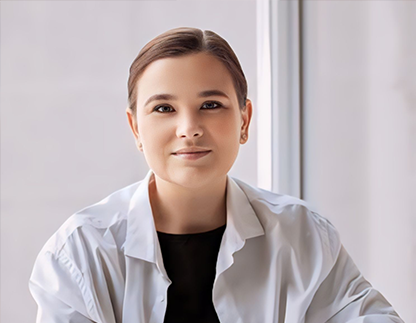I continue to work at Northwestern University because of its high training standards and collaborative attitude toward trainees.”
Iryna Boiko
Postdoctoral Scholar in the Department of Microbiology-Immunology

Iryna Boiko is a postdoctoral scholar in the Department of Microbiology-Immunology in the Feinberg School of Medicine. Iryna is researching Neisseria gonorrhoeae (N. gonorrhoeae) bacteria in the Dr. Hank Seifert Lab, focusing on how it adapts to evade the human immune system.
How would you describe your research and/or work to a non-academic audience?
I'm among the frontier researchers investigating how N. gonorrhoeae, a Gram-negative bacterium responsible for the sexually transmitted infection (STI) gonorrhea, alters its surface proteins to avoid detection by the body's immune system. Understanding this process of antigenic variation is crucial for developing effective vaccines to control gonococcal infections worldwide.
What have been some of the most memorable twists and turns of your career?
I made two key decisions in my professional career. First, I decided to specialize as a clinical pathologist and work in a STI clinic. From day one, I received a great analytical experience and a taste of how to be a medical detective by identifying different STI bacteria, especially N. gonorrhoeae, in clinical samples. Second, I decided to enhance my professional career and do a PhD in medical microbiology, closely studying the antimicrobial resistance and genomic epidemiology of N. gonorrhoeae in my native country, Ukraine.
What is the biggest potential impact or implication of your work?
Every day, I think about the patients—whether they’re waiting for accurate screening and diagnostics or seeking timely and effective treatment—and look forward to a future where we can fully prevent Neisseria gonorrhoeae infections. I am hopeful that one day, researchers will make this a reality. The results of my research will help patients be healthy, build relationships, and happily raise their children without fear of infection from N. gonorrhoeae.
Whom do you admire in your field and otherwise, and why?
I admire my postdoc supervisor, Dr. Hank Seifert, for his scientific curiosity. He shows me how to think in depth about research questions, build simple, but systematic hypotheses, and investigate them step by step. I am also inspired by my thesis supervisor, Dr. Magnus Unemo, for his hard work and collaboration in this field worldwide. Both my supervisors remind me that in science, people are what matter.
Why Northwestern?
Initially, I chose Northwestern University because Dr. Seifert, the world's greatest N. gonorrhoeae pathogenesis expert, works here. I continue to work at Northwestern University because of its high training standards and collaborative attitude toward trainees.
How do you unwind after a long day?
I love spending time with my family—cooking and discussing different topics. I also enjoy reading, walking with my dogs, and listening to music.
Tell us about a current achievement or something you're working on that excites you.
I am developing methods to study the growth of the N. gonorrhoeae bacteria, and accurately track their replication. The purpose of this is to observe how the bacteria adapts its surface proteins—the primary one being the type IV pili—to evade the body's immune system. One of the challenges is that the gene responsible for these adaptations, known as pilE, exhibits high variability among different strains of the bacteria. Consequently, it's not well-documented in public databases used for clinical isoaltes. Our research will provide valuable insights into the understanding of gonorrhea.
What are you most proud of in your career to date?
I'm proud of the trajectory of my career, and how I’ve consistently delved deeper into understanding gonococcal infections. From working as a clinical pathologist, where my focus was on accurately diagnosing gonorrhea in clinical samples, to my doctoral studies, where I pioneered the implementation of an antimicrobial surveillance protocol, providing critical data on antimicrobial resistance and genomic epidemiology of N. gonorrhoeae in Ukraine.
Now, as a postdoctoral scholar, I'm at the forefront of research, exploring the intricate dynamics of host-pathogen interaction and the elusive phenomenon of antigenic variation in one of the primary surface proteins of gonococci, type IV pili. It's a captivating puzzle—how these bacteria can alter their surface proteins to evade our body's immune defenses.
Publish Date: March 19, 2024
If you know a graduate student, postdoctoral scholar, graduate faculty member, staff member, or a member of our TGS alumni population who would make a great candidate for our TGS Spotlight Series, please complete this brief TGS Spotlight Series Nomination Form.